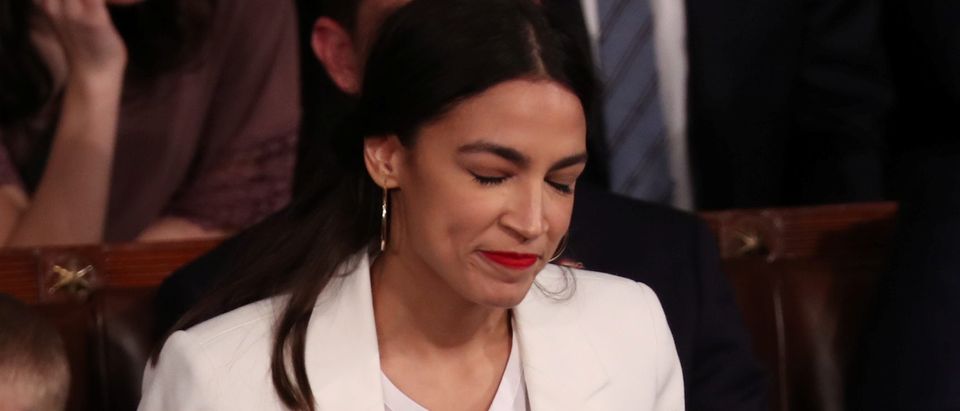Alexandria Ocasio-Cortez, the 29-year-old Democrat recently elected to Congress from New York, has famously suggested (but not yet proposed) that a federal tax of 70 percent be imposed on the portion of a person’s income that exceeds $10 million.
Backward reels the mind to the pages of yesteryear when President Roosevelt’s top tax rate was 94 percent. He had proposed a rate of 100 percent, saying that at a time of grave national danger (i.e., World War II) no American should have a net after-tax income of more than what today would be $400,000.
Ocasio-Cortez and her ilk see another “emergency,” and one far more threatening than a simple world war. Their emergency is climate change, to the reduction of which, via a Green New Deal (which would end fossil fuel use in 12 years), Ocasio-Cortez’s tax funds would be devoted.
One is tempted to howl with derision at the proposal of AOC (as she is now known), but a part of what she says is worth listening to — for the same reason some voters in 2016 had trouble deciding between Bernie Sanders and Donald Trump. Between Bernie Sanders and Donald Trump? Holy cow! What’s the similarity?
This is the similarity: both Sanders and Trump were “for” the middle class, and recognized that that class had been essentially abandoned by both political parties. The party of the rich (Republicans) had abandoned them in the quest for corporate profits (however acquired) often by transferring middle-class jobs to China. The other party of the rich (Democrats) had abandoned the middle class in its quests for corporate profits, a pre-industrial-era environment, and identity politics warfare.
There are several problems with AOC’s proposal. First, as always, is the uneasy case for taxing people differently. Why should A pay a larger percentage of his income than B? Whatever happened to the idea of equal treatment?
Second is the problem with giving money to government, an act that can be as dangerous as giving matches to small children.
What would government do with the extra money collected by AOC’s tax? It would likely do what it is currently doing: give it to the maker of Tesla electric cars, Elon Musk — whose take-home pay in 2016 was $99,744,920, paid for in part by the $7,500 tax rebate the federal government gives each purchaser of a Tesla car (priced from $68,000 to $138,800, while supplies last).
Still, sky-high salaries are a problem, and they seem un-American. The Blackstone Group’s Stephen Schwarzman’s 2018 take home pay of $786.5 million may make the compensation of Apple’s Tim Cook ($150 million), Google’s Sundar Pichai ($106 million) and IBM’s Ginni Rometty ($96 million) look paltry, but they all set bad examples.
Milton Friedman, asked about sky-high salaries, said they were a problem, but that any attempt by government to deal with the problem was likely to be worse than the problem itself.
In the opening of F. Scott Fitzgerald’s short story “The Rich Boy” (1926), the narrator says, “Let me tell you about the very rich. They are different from you and me.”
Perhaps, but for at least some of America’s history the rich weren’t all that different, if only because there wasn’t that much to spend money on. Really rich people could buy big estates and have liveried servants weeding the vegetable garden and they could have private railway cars. But there wasn’t any television or treatment for cancer, and traveling by private railway car was far more challenging than rolling out the G5.
The rich may have been different but, in the pre-tabloid, pre-television age they and their excesses were far less visible.
As recently as 1963, Charles Murray writes in Coming Apart, “America didn’t have a lower class or an upper class.” Many poor people refused to identify themselves as lower class, and many affluent people refused to call themselves upper class.
“Those refusals,” Murray writes, “reflected a national conceit that had prevailed from the beginning of the nation: America didn’t have classes, or, to the extent that it did, Americans should act as if we didn’t.”
Today we have a hollowed-out middle class, and especially hollowed-out middle class men: unemployed, unmarried, childless, and plagued by opioids.
Ocasio-Cortez’s Green New Deal is malarkey of course, but she’s young and new at this game, which is why she proposed a ho-hum rate of only 70 percent. But when — if? — she grows up, she’ll be proposing FDR’s 100 percent rate on people who’ve gotten uber-rich at the expense of the middle class, the funds to be devoted to assisting that middle class, not some fatuous green dream. That proposal may get serious attention.
Daniel Oliver is chairman of the board of the Education and Research Institute and a director of the Pacific Research Institute for Public Policy in San Francisco. In addition to serving as chairman of the Federal Trade Commission under President Reagan, he was executive editor and subsequently chairman of the board of William F. Buckley Jr.’s National Review.
The views and opinions expressed in this commentary are those of the author and do not reflect the official position of The Daily Caller.


